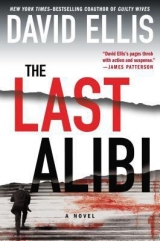
Текст книги "The Last Alibi"
Автор книги: David Ellis
Жанры:
Триллеры
,сообщить о нарушении
Текущая страница: 23 (всего у книги 31 страниц)
86.
Jason
12:15 P.M.
I ring Alexa’s doorbell and take a couple of steps back. A flutter of nerves passes through me, but my whole body is so screwed up right now, it’s hard to tell what’s causing which problem inside me. My skin is tingling, my abdominal muscles are churning, a dull ringing has taken up nearly permanent residence between my ears.
I hear footsteps approaching the front door and steel myself. The curtain over the small side window moves, and then the lock on the door clicks.
“Hi,” she says. She is wearing a long football jersey and torn jeans, no shoes or socks. Her hair is matted and messy. Her eyes are red and puffy but, it seems, hopeful.
Hopeful, that is, until her eyes move to the suitcases next to me.
“I brought your things,” I say.
“I don’t want them. Keep them.”
“Alexa, c’mon.”
She leaves the door open and walks into her living room. I’d rather have this conversation on the front porch, but this will do. I carry in the suitcases and set them down by the door.
“Do you . . . want something?” She sits on her leg on the couch.
“I’m fine.” I sit next to her. It’s an old, beat-up leather couch. “I just want to talk to you for a few minutes. Is that okay?”
Her eyes narrow. “Now you want to talk.”
“You got my attention, yes,” I say. “I got your e-mail and that letter. If you feel like you want to send that, go ahead and send it. I won’t deny what you wrote. Maybe I deserve to be reprimanded. I’m sure I do, actually—”
“Forget about the letter,” she says, her expression switching in a finger-snap. “You know I could never hurt you.” She touches my arm. Somehow it would feel cruel to recoil, to move my arm away, to deny her that small gesture.
My phone rings, giving me an excuse to reach into my pocket, thereby breaking free of her and altering my body position. “Just need to make sure it isn’t Joel,” I say, by way of apology. Actually, I know it’s not Lightner calling because we programmed the Dragnet theme as a ringtone for his calls, but Alexa doesn’t know that. I look at the face of the phone and don’t recognize the number, then set it down on the couch between us.
The other ringing, the one taking place inside my head, grows shriller. My temples begin to throb. Skin on fire, bitterness on my tongue, a stomach ready to rock-and-roll at any time.
“Alexa,” I say, “our favorite serial killer called again last night. He said he’s going to kill again, and the next one is going to be his ‘favorite.’ I’m really concerned he might go after someone I care about.”
She scoffs and makes a face. “Well, that rules out me, doesn’t it?”
“No, it doesn’t. Listen, please—please get out of town. Drive somewhere. Fly somewhere. Please.”
“I’m not going anywhere. What’s he going to do to me that you haven’t already?”
“Oh, c’mon, Alexa. You’ll get past this. You know you will. Sometime soon, you’re going to look back and realize that . . . this is for the best.”
“How can you say that?” She leans toward me, her hand moving toward my face.
How can I say that? Because we both knew I was drugged up, and getting worse, and making more and more excuses as time wore on. The oddest part is that whenever Alexa invoked the excuse of my bad knee, whenever she had a pill at the ready for me when I awoke at night, I viewed her as an ally, the only one who understood me.
The addiction was my fault. But she feasted on my weakness. If I was the captain of my personal Titanic, she was my first mate, whispering sweet nothings, telling me what a good job I was doing steering the wheel, and don’t worry about those glaciers. I can’t forget that. If I do, I’ll lose everything.
But now is not the time to get into all of that. This moment calls for a defter touch.
“I have to focus on ‘James Drinker’ or whatever his name is,” I say. “He has to be my singular focus.”
She watches me with those wide deer eyes, wounded, fighting tears again.
“You’re doing this because of this man?” she says. “Or because of the drugs?”
She recalls, of course, that I mentioned the addiction when I broke up with her. And now I’m talking about a serial killer.
“It’s both things,” I say. “But this man—he’s dangerous. And he’s not done. I need to catch him, and I need you to be far away so you’re out of harm’s way.”
She grabs my forearm. “Just give me one more chance. I’ll do whatever you want me to do. I’ll be whoever you want me to be. Please, just one. What can it hurt?”
I gently peel her fingers off my arm and pull away, get to my feet. “I’m afraid it’s over, Alexa. That’s not going to change. So please accept that.”
“I don’t. I don’t accept that.”
I start for the door.
“I gave you everything!” she cries. “I gave you every part of me. I opened myself up to you in every way because I trusted you.”
“I’m . . . I’m sorry how this turned out,” I say. “You deserve better. But it’s over and it’s not going to change. You need to understand that.”
She breaks eye contact, tears flowing freely, her jaw steeled.
I reach the door and open it.
“Shauna turned you, didn’t she?” she says. “She’s been trying to break us up all along. She’s staying with you right now, isn’t she? She’s being super-helpful about your ‘recovery,’ I’ll bet. Yeah, I’ll bet she is.”
“This has nothing to do with Shauna,” I say.
“That’s bullshit.” She laughs with bitterness.
“Good-bye, Alexa. Please take care of yourself.”
Her eyes are suddenly ablaze with fury, her mouth tangled, her hands balled in fists. My stomach clenches up, stealing my breath. I turn away so she can’t see me.
“This is not over,” she says. “You think this is over?”
I catch my breath, squeeze my eyes shut. “It’s over, Alexa.”
“One phone call to the police hotline,” she says. “That’s all it would take.”
I pause, gritting my teeth, my abdominal muscles twisting into knots, my stomach in upheaval, black spots dancing before my eyes. I need to get home. I have to get home.
“Yup, that’s all it would take,” I say before I pull open the door and leave.
87.
Jason
1:20 P.M.
I stagger through my door and collapse onto the cold tile of my town house foyer. My stomach unleashes its contents, but there aren’t any contents, only bitter, sticky liquid in my mouth. I put my face down on the tile and try to catch my breath. The floor spins and jukes beneath me.
Something they don’t tell you: The first days of withdrawal are not the hardest. It’s the time after those first few days, when your mind and body are settling in on a new reality—that the fun candy isn’t coming in like it used to—that the mind and body decide to tell you what they think of that decision.
Shauna comes rushing down the stairs. She came with me this morning to my house to help pack Alexa’s clothes and toiletries, and we decided to stay at my place for the rest of the day. A change of scenery, mix things up, keep me out of a funk—amateur psychology, but we’re doing the best we can.
“Take this,” she says, handing me a pill. I’m past seven hours now. I did a shit job of planning this thing. “Don’t chew it, Jason, no matter how much you want to.”
I do what she says. I swallow it and wash it down with water she gives me. It will work the way it’s supposed to—slowly releasing pain suppression, albeit over a short time window—instead of the way I typically took it, crushing it between my teeth to get the entire impact all at once. Every time I’ve taken one of these over the last several days with Shauna’s oversight, I’ve had to fight the instinct to bite down, to release all of the glorious love instantaneously. This process would probably be easier if I had the kind of OxyContin that is typically marketed these days, time-release pills that are crush-proof so addicts can’t do exactly what I used to do and go for the instant home run. But someone would have to prescribe that for me, and nobody will, certainly not Dr. Evans, whom I haven’t seen in a month. So I’m left with the ones I purchased from Billy Braden, the crushable boys.
Shauna helps me up the stairs, which isn’t easy given our size differential, but somehow I make it to the couch in my living room. I curl up on my side in the fetal position while she examines me. I am shivering and sweating. My head is screaming, the high-pitched whine that televisions make when they’re doing a test: This is a test, this is a test of the emergency broadcast system, this is only a test, BRRRRRRRRRRRR—
“This is too hard for us alone,” she says. “I was beginning to think we could do this. You were doing so well. But Jason, this is—”
“I’m not . . . not checking into a . . . not yet . . . not yet . . .”
She buries her face between my neck and shoulder. “Keep fighting, Jase,” she whispers. “Will you keep fighting?”
“I’ll keep . . . fighting,” I say, as I lurch forward again, more dry-heaving. “Shit, Shauna,” I say between halting breaths, “how did I . . . ever let this . . . happen?”
“It happens to the best of people,” she says, wiping my wet hair off my face, stroking my cheek. “It’s poison. It ruins people. But it didn’t ruin you, Jason. You stopped in time. You’re going to break free of this. You have to believe that.”
“This isn’t . . . this isn’t going to end well . . . you know that . . .”
“It is going to end well, Jason. You’re going to beat this.”
“No,” I say, squeezing my eyes shut, my hands clutching my stomach. “I mean Alexa . . . Something bad’s go—going to happen . . .”
88.
Shauna
4:30 P.M.
Jason begins to stir, making wake-up noises on the couch, where he’s been since he came home a few hours ago. Something really turned him sideways today. None of these days has been good, but these last few hours have been the worst by far. It’s unnerving, to put it gently, seeing him like this. He was taking this on bravely, using exercise and activity to keep his mind off things, even extending his withdrawal interval from six hours to seven. It was bad, sure. He threw up and cramped up and couldn’t sleep. It wasn’t a picnic. But he had a game plan and he was sticking to it. He seemed to be succeeding. I was beginning to think I’d overplayed this whole recovery thing in my mind, that this was going to be easier than I thought.
I don’t think that anymore. The hour that Jason endured when he first stumbled into the house was his worst hour, twenty times over, constantly retching and seizing up, sweating profusely and trembling at the same time. I almost dialed 911 for an ambulance, but he wouldn’t let me, he said he was okay. After some amount of OxyContin infiltrated his system, he began to calm, but still not as much as I’d hoped. It wasn’t until he fell asleep an hour ago that I felt safe even leaving his side on the couch.
He sits up now, moaning. I’m behind him, by the breakfast bar in his kitchen, looking at my laptop online at detox clinics. “Hey, sunshine,” I say, coming over to him, sitting next to him on the couch. “Rough ride you had there.”
His hair is matted from sleep and sweat. “Yeah, it wasn’t too fun. I got too cute with the time intervals. I need—”
“You need to get professional help,” I interrupt. “You need to quit trying to self-administer your recovery. I don’t care about ‘James Drinker’ or Alexa or anybody else. That will all sort itself out. I only care about one thing right now, and that’s getting you clean. You need to go in now, Jason. Tomorrow. Let’s do it the right way.”
“Okay.”
“I know how much you—What? Did you say . . . okay?”
“Okay,” he says. “You’re right. If I don’t beat this, nothing else will matter. I’ll check in somewhere tomorrow.”
“Oh, Jason.” I put my face against his. It’s not like Jason to give in so easily on something like this. He must realize it now, too, the climb he’s facing, how hard this really is.
“This thing is kicking my ass,” he says. “I took way too much of this crap for way too long.”
A bit of color has returned to his face. Out of the woods, for the moment. Some awful moments, followed by some not-so-awful moments. That’s what this is going to be like, I realize, this roller-coaster recovery.
“You want to eat?” I ask. The only thing he’s been able to tolerate is peanut butter toast.
“No . . . not now.”
“You have to try.”
“Later. Don’t make me eat right now.”
At five o’clock, his highness finally dines on peanut butter toast and a bottle of water. At five-thirty, he throws up. At six o’clock, he does push-ups to failure (that’s how jocks talk about weight lifting, doing reps “to failure”), which in this case is seventeen push-ups, not bad by most people’s standards but low for Jason. At seven o’clock, it’s time for another pill—back to six-hour intervals—and he forces himself to swallow it; at first I think the pill must be hard to swallow, but then I realize that’s not it, that he’s really fighting the urge to chew it up and get a surge of the good stuff all at once.
At eight o’clock, he’s feeling pretty good. He has good color. His eyes are clear. He has enough energy for thirty-five push-ups.
At a quarter past eight—actually 8:16, to be precise—his telephone rings, the landline, a portable phone collecting dust on a rechargeable cradle in the corner of the room.
“Hey, my cell phone,” he says, patting his pockets as he stands up. “Where’s my cell? Oh, shit—I left it at Alexa’s. I left my cell at Alexa’s.” He walks over to the portable phone and checks the caller ID. “Speak of the devil,” he says.
“Don’t answer it. Or answer it, if you want to,” I quickly add.
He lets out a long sigh and picks up the phone. “Hello? What? I can’t under—Okay, slow down . . . slow down, what? Where—where are you? Where are you?” Jason goes quiet for a long time.
“Jason, what’s going on?” I holler.
He puts a finger to his lips to shush me—right, he doesn’t want Alexa to know I’m here with him, and there I go shouting to him.
Jason turns his back to me, resting a hand on the top of his head as he listens. “What now? It’s hard to hear you—we’re talking over—go ahead. I said go—what? Say that—say that again.”
Jason’s posture goes ramrod straight.
“I’m coming over,” he says. “Sit tight. I’ll be right over.”
“What?” I say, when Jason punches out the phone.
He turns to me. “I have to go,” he says. “I—I have to go.”
89.
Jason
8:50 P.M.
I find a parking space on Wadsworth, a few houses down from Alexa’s bungalow, and race up the steps to her door. I knock on the door and it falls open.
I step in. “Alexa? Alexa.”
She is sitting in her living room, the lights off, the curtains pulled, the room dark, save for the illumination from the television, an old movie, Doctor Zhivago, I think, with the sound on mute.
“Are you okay?” I ask.
“Am I . . . okay. Huh,” she hiccups without humor. She is motionless, the dancing light from the TV playing shadows across her body, her face.
Something makes me stay where I am, halfway between the front door and the living room where Alexa is sitting, her back to the wall, facing me. The flickering light is messing with my vision, playing with her facial features, masking them, exaggerating them.
“Did you hurt yourself, Alexa?”
She doesn’t answer at first. The smell of food—pizza? pizza—wafts past me. She doesn’t even like piz—
“You have no idea what I’m capable of,” she says. “You never did.”
“Tell me.” I raise my hands. “Tell me what’s going on. I couldn’t even understand you on the phone. I thought you said that you were going to kill yourself.”
She makes a noise in her mouth, like a giggle, something fleeting.
“No, Jason, that’s not what I said.”
She raises her hand, holding something, showing it to me in the dark.
“You left your iPhone here,” she says slowly, as if she’s saying something of paramount significance. “There’s a voice mail you should hear from this afternoon.”
She lowers her hand and plays with my phone. A moment later, blaring out from the speakerphone is Joel Lightner’s voice:
“Get ready to be happy, sport. I found him. I found our fucking guy! We were looking for cons recently released from a state penitentiary. This guy came out of a federal facility in January. You got him to confess to a gun charge, like, eight years ago, but you handed him over to the feds and they prosecuted him. We were looking in the wrong damn place! His name is Marshall Rivers. He’s got a history of violence against women and, since he got out, he’s been working at a dry cleaner’s two doors down from Higgins Auto Body! He probably saw James Drinker every day! Anyway, Marshall Rivers, does that ring—”
The recording stops abruptly, mid-sentence. I steady myself with a hand to the wall, squeeze my eyes shut, lower my head, then slowly raise it. Marshall Rivers. Marshall—
Okay.
I remember him. I remember Marshall Rivers.
I remember a bad guy. Pure evil.
I remember a scared witness, a young woman.
I remember what I did to him.
And when he got out, he came back to pay me his respects. He came to my office in disguise, assumed a different name, and watched me sit helplessly while he carved up five women on the north side of the city.
Marshall Rivers is “James Drinker.” Marshall Rivers is the North Side Slasher.
“Finally,” I mumble. Then I look at Alexa, remembering the truncated nature of the voice mail. “Did you pause the message or did it just stop there?” I ask. “Is there more?”
From her dark corner, Alexa stands slowly and inches toward me, crossing the line of the television light, blocking it out, leaving us in darkness, her features changing with each step—
–the face of a ghost, a haunted figure, piercing eyes, a wry grin, a scowl, terror and rage and panic and fear—
“There’s more,” she says to me. “There’s a lot more.”
EIGHT YEARS AGO
90.
Jason Kolarich
Assistant County Attorney
The shower water scalded his skin, the way he liked it. The heat would stay on him for hours, keep him refreshed. It was little things like that—small meals, lots of coffee, catnaps when you could get them, and hot showers—that kept him on his game.
Whoever it was who decided to put Felony Review prosecutors on seventy-two-hour shifts had a sadistic streak. He had until tomorrow morning at ten before his shift ended and he could really sleep—unless, of course, he caught a case and had to see that one through post-shift.
He dried off, dressed in the same underwear and the same clothes, knotted his tie and finger-combed his hair. The door in the police locker room popped open, and cool air hit his skin.
“Counselor, we need you.”
“Coming, dear,” said Assistant County Attorney Jason Kolarich.
He was upstairs five minutes later, his shirt still wet from beads of water, his brain foggy. He walked into the detective squad room’s small kitchen, which served as Kolarich’s makeshift office. He put his hand out, and Officer Richard Nova dropped the report in it. Kolarich read it over quickly and then looked up at Nova, looking for any facial expression, finding none.
Kolarich read the report again. “We have the gun.”
“Right.”
“And eyes.”
“Right.”
“Whose eyes? Yours?” Kolarich looked up at Nova. Richie Nova was stocky and fit, young and sometimes too eager, but one of the by-the-book guys, one of the good ones. Most cops were good ones. Some of them were not. It made a difference to Kolarich.
“Mine and Gina’s. Happened right in front of us, the gun toss.”
Kolarich flipped past the officer’s report to the suspect’s priors. Something similar in the past, five years ago—an aggravated assault pleaded down to simple; he’d accosted a woman with a firearm. With the plea, he avoided prison. Six months later, he was arrested for the rape of a teenage girl in an alley off Marquette; the witness had a change of heart and he was released when she refused to testify. In another six months, a gun charge and possession of cocaine that got him three years, give or take. He’d been out just about a year, and now he was back to his first crime, abducting women at gunpoint.
That made three women, including this one tonight, that he’d attacked.
“Marshall Rivers,” said Kolarich. “He sounds like an aristocrat.”
“He’s no aristocrat, this one.”
“Okay. Where’s the witness?”
“She’s in Two,” said Nova.
Kolarich grabbed a notepad, stuck a Bic pen in his front shirt pocket. In Interview Room Two, a young woman was standing over a small wooden crib, where an infant slept with blankets wrapped tightly over her. Kolarich didn’t know where the crib had come from, but they must have kept it around for situations just like this.
It was almost ten o’clock at night. The attack had happened around six, as dusk had settled over the city in early spring.
The woman, the mother, was really just a girl, all of eighteen years, with dark, kinky hair pulled back with a rubber band, a thin face, and large brown eyes. She was wearing a pink cotton long-sleeved shirt and jean shorts, denim cut off a respectable length down her thigh.
Kolarich trod lightly, lifting the wooden chair off the hardwood floor to avoid scraping. “Miss Flores?” he said.
“Yes,” she said with some effort, a hint of j on top of the y. English was not her first language. It might not be her language at all. She sat in the chair opposite Kolarich and laced her hands together, as if in prayer.
“Hablas inglés?”
“Un poquito,” she answered with apology. “Lee-tle.”
“Bueno.” Where the hell was Witness Services? Why didn’t Nova bring up a translator? Gina Alvarez, Nova’s partner, spoke Spanish, but he needed the official translator. It was a union thing. Pass over the certified translator and someone would file a grievance. It took another half hour before Lisa from WitServ showed up.
“Tell her I’m a prosecutor, and would she please tell me what happened?” said Kolarich, which Lisa translated to Caridad Flores.
She felt more at ease with the translator in the room. The story came out in short bites, because each sentence had to be translated, even when Kolarich thought he understood it, so it had an odd quality to it, not simply a freewheeling, natural conversation. Caridad Flores spoke in a soft, restrained voice, fear shaking her words. Fear from what happened, Kolarich thought, or maybe fear of him, of law enforcement.
She was walking on the sidewalk on the 7100 block of South Briar Way with her baby in one of those travel pouches you wear over your shoulders and drop your baby in, so the baby’s back is against your chest, facing forward, that kind of thing. A nice walk in the fresh air before she put her baby daughter, Gracelia, down for a nap.
But then a car pulled up to the curb. A man got out. He had a gun. He blocked her forward progress and motioned toward the car. She may not have spoken English, but a gun to your infant’s head requires no translation.
Then she did something that the offender probably didn’t expect. She did something smart. She realized that if she got into that car, she and her baby would never get out.
So she ran. And she flagged down a patrol car, around the corner and a block away.
Kolarich knew the rest from the police report. Patrol Officers Nova and Alvarez did a drive-around, found the vehicle that fit the description and the partial plate, and lit their overheads. The offender sped forward. Two blocks into the chase, a gun flew out the driver’s side window and bounced against the curb. Nova jumped out of the car and retrieved it while the driver, Officer Alvarez, continued the chase and cut off the offender with the help of a second patrol unit two blocks farther down. Marshall Rivers was taken into custody without incident. A search of his person and vehicle revealed a crowbar, switchblade, and rope.
Caridad had described the man who confronted her as muscular, bald with a goatee, a white T-shirt, and a tattoo on his right forearm of a knife and snake.
“Okay,” he said. He nodded to Lisa. “Explain the lineup to her.”
Officer Nova and the detective assigned to the case, Lou Carnellis, had been putting together a lineup for identification. They used Interview Room One to do it, because it was the only room with the one-way mirror and observation booth.
Kolarich stood with Nova and Carnellis on the opposite side of the plate glass. “He hasn’t requested counsel?” he asked Carnellis.
“Nope.” Carnellis had lost most of his hair and sucked on lollipops ever since he quit smoking, so most people called him Kojak or Telly, the name of the actor who played the TV cop. Kolarich called him Carnellis. Kolarich was friendly with the police officers, but didn’t want to get too friendly. He wasn’t their pal. Sometimes he had to be the heavy. Easier to do that if you aren’t drinking buddies.
Five men entered the room, each of them holding a card with a number. Kolarich knew that two of them had come from county lockup, and two worked here in the station but had dressed down to civilian clothes. And the man holding the placard that said 2 was Marshall Rivers. Rivers was muscular and bald, with a thick goatee that emphasized his scowl. Kolarich would have identified him even if he hadn’t known already. The guy was bad. Those eyes, something menacing just radiating off him, like he’d never known good, he only had one direction and it was through you. A shudder crossed Kolarich’s shoulders.
The lineup wasn’t bad. Two others were completely bald and two had receding hairlines. All of them were stocky enough. One of them, a weight-lifting rookie officer, was bigger than Rivers, the rest of them comparable but probably not as big as the suspect. Three of them had facial hair, and two did not. The key was to make sure that Rivers wasn’t the only anything—not the only big guy, not the only bald guy, not the only goatee. He had to fall somewhere in the middle, or the lineup wouldn’t hold. It was like a game of Goldilocks.
Rivers, he noticed, had his arms behind his back. He was covering up the tattoo on his right forearm, which Caridad Flores had described.
“Tell everyone to put their hands behind their backs,” said Kolarich.
Carnellis did so, operating a microphone on the console.
“We’re good to go,” he said.
Caridad Flores came in with Officer Alvarez, Nova’s partner, and Lisa the translator. Kolarich explained the drill to the witness, though she probably already knew it. When she turned toward the plate glass, her face tight with fear, a small gasp escaped her and she choked up. Kolarich smelled something, then heard the sound of tiny droplets, then saw it for himself: a small pool at the feet of Caridad Flores. She had wet herself.
“Número dos,” she whispered through her hand. She turned away, and Gina Alvarez put an arm around her.
“Now, arms at their sides,” Kolarich instructed. Carnellis gave the command, and Marshall’s tattoo came into view. Caridad looked again and let out a large cry.
“Número dos!” she repeated.
Kolarich nodded. Officer Alvarez hustled her out of the room.
Caridad Flores was hovering over her baby when Kolarich returned to Interview Room Two with Lisa the translator. They all sat down.
“I’d like you to sign a written statement,” said Kolarich.
The witness listened to the translation, then said something back so quickly that it failed Kolarich’s four years of Spanish at Bonaventure. She was upset, that was clear enough. Her eyes filled, and she pressed her hands against her chest.
“She wants to know if that’s necessary,” said Lisa.
“Tell her yes.” Kolarich looked at Caridad Flores. “Sí, por favor.”
The witness and Lisa talked back and forth a moment in animated terms. Kolarich gave up trying to follow them.
“She says,” Lisa started, then let out a sigh. “She said she may not be positive about everything that happened.”
Jason gave a grim smile. It was how he expressed frustration when it was inappropriate to throw something or shout an obscenity.
“Tell her that with his criminal record, he’ll go away for a very long time,” he said, hoping it was true.
After another lengthy exchange, Lisa shook her head, while Caridad Flores stared at a wall, refusing to look at him.
“Ask her where she’s from,” he said to Lisa.
She did. Kolarich heard the answer: Sixty-fifth and Roseland.
“That’s not what I meant,” he said.
Lisa knew that. So did the witness.
“Ask her,” said Kolarich.
“Ask her what? I already did.”
“Lisa,” said Kolarich, scolding her. “Ask her if she’s here legally.”
He could have added a few things, like I can keep her here all night and find out, but he wanted to start with a light touch.
When the question was translated, Caridad Flores broke into a sob, then a number of por favors spilled out of her mouth.
Shit. She was undocumented. She wanted nothing to do with law enforcement. She wasn’t going to sign a statement. It probably had something to do with a fear of Marshall Rivers, but her bigger fear was being deported.
“Okay,” said Kolarich. “It’s okay.” He patted the air. Caridad Flores looked at him, unsure of what was happening, what was going to happen.
Kolarich said, “Give me a few minutes,” and left the room.
Kolarich quickly found Detective Carnellis. “Put him in Three,” he said.
“Three? Why Three?”
Kolarich gave him a look. The question between them was obvious, as was the answer. Interview Room Three didn’t have one-way glass. Nobody would be able to observe the interrogation.
“Put him in Three,” Kolarich repeated.
Kolarich found a phone at one of the detectives’ desks. He balanced it between his ear and shoulder and fished the card out of his wallet.
Lisa the translator came up behind him. “You’re going to call Immigration on her?”
Kolarich dialed the phone.
“Jason,” she said. “You’re going to get this poor girl deported? Or locked up until trial? She has a baby.”
Kolarich looked at her. “Tell me honestly, Lisa. You think there’s a snowball’s chance in hell that this woman will show up and testify against the offender?”
Lisa blinked twice. “No,” she conceded.
“So without her, I have no case on the attack. She’s all I’ve got, Lisa. She’s it. So if she’s unwilling to testify, I need another avenue. Just . . .” He waved at her. “Tell Caridad it will all be fine.”
He finished dialing and the phone rang.
“You tell her,” Lisa spat. “I’m not going to lie to her.” She stormed off.
“Patrick Romer,” the voice answered, in that crisp, federal-law-enforcement tone.
“Romie, it’s Jason Kolarich.”








